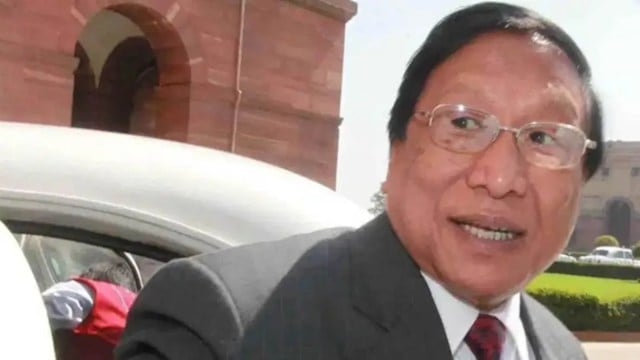27 years after ceasefire, NSCN-IM threatens to resume ‘violent armed resistance against India if…’
This comes after a few rounds of talks between NSCN (IM) leaders – but not 90-year-old Muivah himself – and the Centre’s interlocutor A.K. Mishra in Delhi last month.
 Thuingaleng Muivah, the general secretary of NSCN(IM). (File)
Thuingaleng Muivah, the general secretary of NSCN(IM). (File)Twenty-seven years after agreeing to a ceasefire, the Isak-Muivah faction of the National Socialist Council of Nagaland (NSCN-IM) has issued an an ultimatum to the Union government threatening to “resume the violent armed resistance against India” if the Centre did not “honour” the 2015 Framework Agreement signed by the two parties to resolve the Naga political problem.
In a five-page statement signed by its general secretary Thuingaleng Muivah, the insurgent group, which first signed a ceasefire with the Indian government in 1997, said “we rule out peaceful means against the ignominious betrayal of the letter and spirit of the Framework Agreement of August 3, 2015”.
This comes after a few rounds of talks between NSCN (IM) leaders – but not 90-year-old Muivah himself – and the Centre’s interlocutor A.K. Mishra in Delhi last month. It also comes at a time when the central government is also holding parallel talks with Naga National Political Groups (NNPGs), an umbrella body of seven Naga organisations excluding the NSCN (IM).
Last week, the NNPGs urged the Centre to finalise a Naga accord this year itself based on a separate “Agreed Position” signed with them in 2017.
An apparent impasse over the question of a separate Naga flag and constitution is one of the sticking points in the negotiation between the NSCN I(M) and Union Government. Although issuing his ultimatum, Muivah suggested that he was still leaving the window open, proposing “third party intervention” as a final step.
“However, in the first place, we propose a third-party intervention to resolve the betrayal of the letter and spirit of the Framework Agreement of August 3, 2015 but if such a political initiative is rejected by the GOI, the NSCN shall resume the violent armed resistance against India for defending the Nagalim unique history and her sovereign existence,” reads the statement.
According to sources, the “third party” referred to in the statement is being interpreted as a foreign mediator.
In his statement, Muivah has maintained that the “letter and spirit” of the Framework Agreement officially recognised and acknowledged a sovereign Naga national flag and Constitution. Reiterating his held position that a political agreement on the Naga issue has to be based on the Framework Agreement – and the NSCN (IM)’s interpretation of it — Muivah said: “Nagalim and the NSCN will not wait forever for the GOI to respect and honor the letter and spirit of the Framework Agreement… neither shall we wait for the GOI to recognise and acknowledge Nagalim sovereign national flag and Nagalim sovereign national constitution in the political agreement.”
Significantly, even after the NSCN (IM) and the Centre signed the Framework Agreement in 2015, an accord has yet to be arrived at. Simultaneously, the Centre also began parallel talks with the NNPGs and signed a separate “Agreed Position” for an accord with them in 2017.








